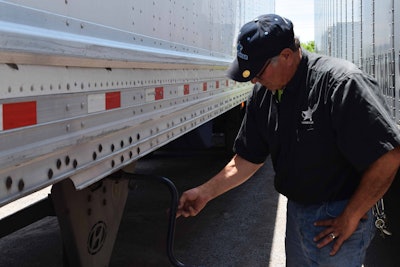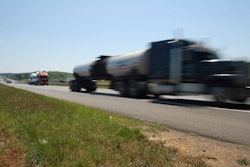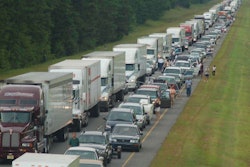With the speed limiter proposed rule’s comment period one day nigh (all interested parties have until one minute to midnight EST on Wednesday, Dec.7, to file a formal comment), I thought I’d share the view of an outspoken critic of the proposal — and the very idea of mandating speed limiters for commercial, given the kinds of risky behavior they seem to be engendering in a subset of the nationwide U.S. fleet’s drivers.
Gary Buchs and I talked at length about some of these issues in a podcast you may have heard back in the summer after I made an Ashland City, Tenn.-to-Moline, Ill., run with the Landstar-leased owner-operator. But his comment I’m inclined to see a veritable model for how these things should be approached, combining firsthand observation, reasoned argument and more. Take a read through it below, and if you’re planning on commenting over the next day, see if it maybe gives you an idea or two.
Whatever you do, don’t call FMCSA a bunch of communists, as has been noted previously (yes, it happens, even in the formal setting of the federal docket, and no it doesn’t help anybody’s argument) …. Safe hauling this Tuesday…
 Buchs at work
Buchs at workGary Buchs’ comment on the speed limiters proposed rule
Thank you for extending the opportunity and time period to comment on the issue of implementing the mandatory use of speed limiters in all trucks exceeding 26,000 lbs. gross weight.
I am an owner-operator with 30 years of commercial experience driving local, regional and interstate transportation. I have also over the past 9 years been involved with teaching driver’s ed classes about the No Zone with the Illinois State Police and Illinois DOT.
I personally oppose the implementation of the proposed rule to require all the identified trucks to utilize a speed limiter system.
I have experience driving trucks with speed limiters and without.
I believe that this and all traffic rules and laws need to be founded on evidence-based research that looks at the issues from a multi-faceted approach. I think it is vital to identify every possible behavioral, economic, and safety-related effect of any rule or equipment changes prior to implementing such a rule.
Because certain carriers already have speed limiters it is relatively easy to know which trucks that I share the highway with are operating with the limiters already in effect. What I observe with the drivers of trucks with speed limiters are some very predictable behaviors.
- It is obvious to me that the majority of these drivers use the speed limiter setting to determine their minimum driving speed. These carriers are the ones I see most often speeding in lower-speed zones in an attempt to offset their inability go faster than the actual speed limit when driving regular highway miles. Their motivation is obviously that they are attempting to travel more miles within the time allotted by the HOS rules.
- This high-risk behavior is very prevalent in construction zones endangering not only other drivers but the construction workers that the lower-speed zone is designed to help protect.
- It seems the drivers of this equipment become more complacent with their speed and following distance and fail to maintain adequate spacing to allow other traffic to safely change lanes, encouraging road rage behavior.
- On the open highway the first most obvious behavior observed is attempting to pass other speed limited trucks, which results in blocking traffic, sometimes for miles, while doing so. Of course, this frustrates those driving behind the two trucks blocking both lanes, which often leads to those drivers making bad decisions, such as trying to pass on the shoulder or being very aggressive, cutting in too soon once the one truck finally gets around the other. These frustrated drivers also tend to tailgate the trucks, further increasing risk for all involved.
I have concerns that people believe that requiring this piece of equipment that will prevent trucks traveling at higher rates of speed will magically solve the problem. Without addressing the new behaviors that will evolve to offset the perceived economic impacts on drivers and companies, speed limiters alone may end up creating a whole other set of safety issues for the driving public. It concerns me that in the past there haven’t been any real strong coordinated educational efforts to address the problems that these regulations are attempting to solve. In my opinion, reducing big truck accidents requires a large-scale, well-coordinated program for all truck drivers as well as company management. And the non-truck drivers would benefit from more education and information about how to drive safely around big trucks as well.
Comments can be made via this link through the end of the day Wednesday, Dec. 7.
Another concern I have is one that the [FMCSA’s own] “Large Truck Crash Causation Study” brings up. Currently, there is no the capability to adjust the speed limiter settings on the go for the locale in which the truck is driving. Having all trucks only going 65 in a 75 mph speed zone with other traffic moving at 80-85 mph is a recipe for disaster.
In addition, having certain trucks exempt from this mandatory speed limiter regulation would create a speed differential, creating greater problems between the truck drivers with and without limiters. –Gary Buchs (Comment slightly edited for clarity)











